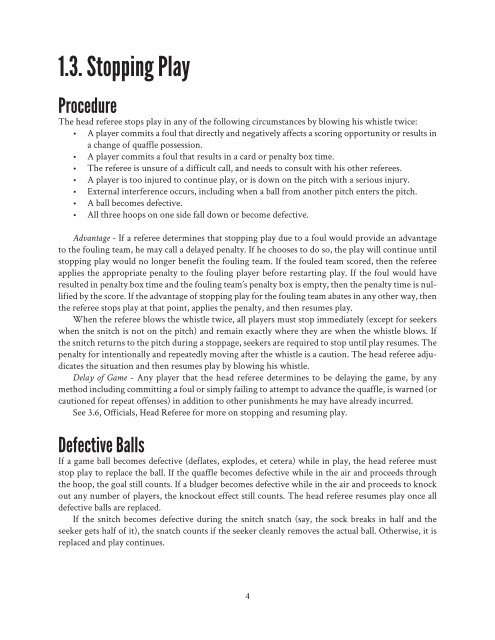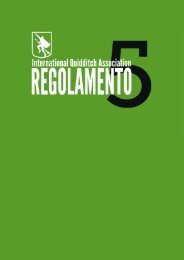IQA Rulebook - International Quidditch Association
IQA Rulebook - International Quidditch Association
IQA Rulebook - International Quidditch Association
Create successful ePaper yourself
Turn your PDF publications into a flip-book with our unique Google optimized e-Paper software.
1.3. Stopping Play<br />
Procedure<br />
The head referee stops play in any of the following circumstances by blowing his whistle twice:<br />
• A player commits a foul that directly and negatively affects a scoring opportunity or results in<br />
a change of quaffle possession.<br />
• A player commits a foul that results in a card or penalty box time.<br />
• The referee is unsure of a difficult call, and needs to consult with his other referees.<br />
• A player is too injured to continue play, or is down on the pitch with a serious injury.<br />
• External interference occurs, including when a ball from another pitch enters the pitch.<br />
• A ball becomes defective.<br />
• All three hoops on one side fall down or become defective.<br />
Advantage - If a referee determines that stopping play due to a foul would provide an advantage<br />
to the fouling team, he may call a delayed penalty. If he chooses to do so, the play will continue until<br />
stopping play would no longer benefit the fouling team. If the fouled team scored, then the referee<br />
applies the appropriate penalty to the fouling player before restarting play. If the foul would have<br />
resulted in penalty box time and the fouling team’s penalty box is empty, then the penalty time is nullified<br />
by the score. If the advantage of stopping play for the fouling team abates in any other way, then<br />
the referee stops play at that point, applies the penalty, and then resumes play.<br />
When the referee blows the whistle twice, all players must stop immediately (except for seekers<br />
when the snitch is not on the pitch) and remain exactly where they are when the whistle blows. If<br />
the snitch returns to the pitch during a stoppage, seekers are required to stop until play resumes. The<br />
penalty for intentionally and repeatedly moving after the whistle is a caution. The head referee adjudicates<br />
the situation and then resumes play by blowing his whistle.<br />
Delay of Game - Any player that the head referee determines to be delaying the game, by any<br />
method including committing a foul or simply failing to attempt to advance the quaffle, is warned (or<br />
cautioned for repeat offenses) in addition to other punishments he may have already incurred.<br />
See 3.6, Officials, Head Referee for more on stopping and resuming play.<br />
Defective Balls<br />
If a game ball becomes defective (deflates, explodes, et cetera) while in play, the head referee must<br />
stop play to replace the ball. If the quaffle becomes defective while in the air and proceeds through<br />
the hoop, the goal still counts. If a bludger becomes defective while in the air and proceeds to knock<br />
out any number of players, the knockout effect still counts. The head referee resumes play once all<br />
defective balls are replaced.<br />
If the snitch becomes defective during the snitch snatch (say, the sock breaks in half and the<br />
seeker gets half of it), the snatch counts if the seeker cleanly removes the actual ball. Otherwise, it is<br />
replaced and play continues.<br />
4



